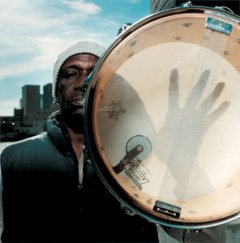Tony Allen's Afro Beat
"We have funk drumming, reggae drumming, and we have afro-beat drumming. Not everybody knows about this style and I want to show people what it is. Sometimes I hear people trying to play in an afro- beat way but the drummer is just playing funk or whatever. That is not afro-beat music. The music has certain ingredients. Afrobeat is not just one pattern. Each pattern can be played at different tempos. It's one person playing like four - you understand ? I started adding the hi-hat to the highlife grooves. Highlife is originally from Ghana but you can hear it in Nigeria and Senegal as well. Highlife was the rock and roll of West Africa". ( Tony Allenko on afro-beat at mimfilms ).
"People thought I should be playing exactly like Fela. But Fela is Fela. It should be his children who should play like him, if they want to, but me, I'm not his son, I'm alone. And the beat is me, why can't I take it to a different direction ?" ( Tony Allenko on his newest releases as featured in Motion at Motion )
Tony Allenko began playing music as a radio technician. He soon picked up percussion and then the drums and became a full time musician by the age of 18. Allen played in many different bands among which : The Western Toppers Highlife Band, Victor Olaiya, Agu Norris and The Heatwaves.
In 1964 he acquainted with Fela Ransome Kuti whom he had already met shortly before and whose jazz saxophonist skills made a strong impression on Allen. The pair soon began to work together developing highlife jazz within the Fela Ransome Kuti Quartet who played jazz on the Nigerian Broadcasting Corporation's radio.
In 1965 the "quartet" gave way to the Koola Lobitos who soon left Nigeria to tour the west coast of the US. Though the band encountered financial difficulties during this tour, the trip proved essential in that it exposed the Koola Lobitos to the sound of funk genius James Brown and to a larger extent of African-American music.
Returning from the states the Koola Lobitos changed their names to Fela and his Afrika' 70 and Tony Allen became pivotal in the curving of a new high life derivative : afro-beat, a strong blend of Afro-American funk, jazz and African music.
Within Afrika 70, Allen experienced different drumming styles, some reminiscent of funk in their astute sharpness others deeply rooted in African polyrhythmic structures but he remained a key player in Kuti's formation, directing the band and sharing his musical influence with Ransome Kuti or Fela Anikulapo Kuti - his Yoruba name. It is often reported that Tony Allen was the only Afrika 70' musician for whom Fela never precomposed a part, he gladly welcame Allen's own composition instead.
In 1979, Tony Allen left Fela Kuti and began a solo recording career accompanied by Africa 70 whilst Kuti went on to lead the Egypt 80. Allen played in Nigeria until 1984 when he migrated to Europe (London).
Allen's move to Europe was part of a long thought of master plan : marrying the original beat of afro-beat with all sort of western music ( electronic, funk and jazz ) and by doing so exposing afro-beat to a wider audience. After some wandering between London and Paris, Allen settled in France in 1985.
After collaborating with Manu Dibango, Roy Ayers and Ray Lenna on Never Expect Power Always. Allen signed his Afrika 2000 to French independent imprint Comet and released a new LP, the critically acclaimed Black Voices that has Allen interacting with Hip-Hop producer Doctor L and funk old-timers Mike Payne and Mudbone Cooper.
Alleged plans to move to London, should give Allen many more occasions to preach his afro-beat gospel to a younger generation.
